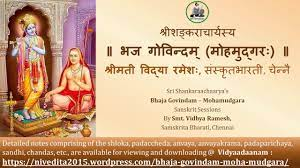मोहमुद्गरं of Sankaracharya (8th century A.D.) is another gnomic poem having a philosophical theme. It recommends the giving up of all worldly pleasures. For more details read here
वेदान्तदेशिकः of 13th
century A.D. is the author of सुभाषितनीवी a work containing 145 verses of wise
sayings, on the model of नीतिशतकं of भर्तृहरिः.
Swamy Desikan’s SubhAshitha Neevi is a didactic lyrical Masterpiece comprising of wise and pithy sayings to guide us about our conductance in day to day life. This is a must to read and listen work for us to lead a righteous life each day.
Swamy Desikan, responded to the fervent appeal of one of his disciples, a king to bless him and his subjects with a good code of conduct, by bestowing this Neethi kavya known as ‘Subhshita neevi’. It contains 144 slokas in Sanskrit . The advise tendered by Swamy Desikan has a universal appeal and is relevant for all times.
It has 12 chapters, five of which covers the mind set of unrighteous ones (theeyavar mana nilai). The remaining 7 chapters describe the mental frame of the righteous Ones.
A disciple of Swamy Desikan was a king with the name of Singa BhUpAlan. He begged his AchAryan to bless him and his citizens with sadhupadEsam (auspicious codes of conduct) and the compassionate AchAryan responded to his sishyan’s plea with this neethi kaavyam containing 144 slOkams. It has been pointed out that one can interpret the meanings of some slOkams in 20 different ways because of their depth of thought. The upadEsams of Swamy Desikan has eternal relevance and is very appropriate for the rightful conductance of modern day statesman and citizens.
(A) The first 5 chapters deal with the conduct of an asamarTan (dullard and vicious one, who is unskilled).
The names of the 5 chapters associated with he asamarTan are:
1. anipuNa Paddhathi
2. Truptha (Garvee) Paddhathi
3. Khala Paddhathi
4. dhurvruttha Paddhathi
5. asEvya Paddhathi
(Dullard’s state)
(Egotist’s state)
(DushtA’s state)
(state of one with heinous conduct)
(State of one, who should not be approached). The codes of conduct described in these 5 chapters have to be rejected by any one, who wishes to follow a righteous way of life.
(B) The remaining 7 chapters deal with the conduct of the righteous ones for emulation by us all:
1. MahaaPurushaPaddhathi:(MindsetofMahaans)
2. Sama-chitthaPaddhathi:(Mindsetofonewithequanimity)
3. SadhAsrithaPaddhathi:(Mindsetofthose,whoseektherighteousones)
4. NeethimathPaddhathy:(Mindsetofone,whodoesnotswervefromrightfulway.
5. VadhAnyaPaddhathi:(theconductofthemostgenerous)
6. (SukaviPaddhathiand:(mindsetofanauspiciouspoet/sukavi)
7. Pareekshitha Paddhathi: (mind set of one who has passed the tests).
The upadEsams housed in the above 7 chapters have to be implemented as code of conduct for the righteous one.
The extraordinary wisdom of Swamy Desikan in analyzing the conduct of the righteous and the unrighteous (Saadhus and the dushtAs) is seen in this kaavyam. Out of his compassion as a caring AchArya, Swamy Desikan bequeathed to us his SadupadEsams in SubhAshitha Neevi to practise and gain “dhaiveem Sampath” that GithAchAryan discusses.
So numerous are the didactic poems in Sanskrit that even a mere mention of their names is beyond the scope of a small work like this.






No comments:
Post a Comment